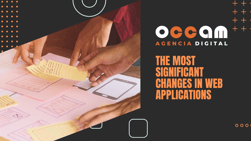Index Content
All software development methodologies have something in common: they are sets of techniques and tools that are used to plan, design, develop, implement and maintain software, i.e. applications that allow users to interact with a computing device in a more efficient way.
However, software development methodologies are very varied, and each of them has its own rules and principles. In this post, we will explain which are the best methodologies for successful software development.
will you join us?
The 8 most popular software development methodologies
There are many software development models, each with its own advantages and disadvantages. The most popular are the agile models, which we will talk about in the following lines.
1. Agile methodologies
They focus on iteration and teamwork for software development, as well as on delivering high quality software in a shorter time frame, among other agile principles. Within the methodologies we can find the following examples:
- Kanban methodology. It focuses on improving workflow and delivering high quality software. It was born in the Japanese automotive industry in the 1940s and its name derives from the word 'board', which is used to visualise the workflow.
One of the main features of the Kanban methodology is the limitation of work in progress (WIP). This means that no new work can be started until the current work is completed, which helps to avoid overload and improve workflow. If you are looking to improve your workflow, the Kanban methodology may be the perfect solution for you.
- Scrum methodology is a software development methodology aimed at delivering high quality products through an iterative and incremental process. In Scrum, a development team is divided into autonomous work teams that are responsible for developing a part of the product. Each team meets regularly to review progress and plan future work.
The Scrum product lifecycle consists of five phases: product backlog (a list of all the requirements of the product to be developed), sprint backlog (a list of tasks to be performed during the sprint), development (the actual product development work is carried out), testing (the product is tested to ensure that it meets all requirements) and deployment (the product is put into operation and delivered to the customer).
Although agile methodologies are the most widely used methodologies today, they are not the only ones. Read on to learn about other software development models.

2. Waterfall Methodology
A form of software development in which a series of strict, orderly steps are followed. This methodology is very detailed and leaves little room for manoeuvre for the development team. It is often used in large, complex projects where it is important that all steps are strictly adhered to.
It is maintained throughout a software project lifecycle, and is characterised by the fact that it is often used when the system requirements are well known and no major changes are expected during development. Although waterfall approaches exist for various types of software projects, this methodology is best suited to structured projects, which are characterised by detailed planning, a staged approach, thorough analysis and design, quality assurance and an implementation phase using a highly structured programming language.
3. DevOps methodology
Emphasises close collaboration between development and operations, and is ideal for software projects that require a rapid release cycle. In short, it is a methodology oriented towards collaboration and coordination between development and operations staff, with the aim of improving the quality and speed of software deliveries.
4. Lean Methodology
Focuses on minimising waste and delivering high quality software. It is based on the Lean manufacturing philosophy and is characterised by a focus on the customer, waste minimisation and continuous improvement. It is based on the principle of "delivering the most valuable thing to the customer as quickly as possible". The goal of Lean is to improve the quality and efficiency of the product or service, and to reduce production time and cost.
5. Spiral Methodology
It is based on an iterative and incremental approach to software development. It is divided into four phases: Start, Growth, Maturity and Decline. Each phase is divided into the following sub-phases: Planning, Analysis, Design, Implementation and Testing. Its main characteristics are:
- It is based on a spiral life cycle.
- It addresses risk in a systematic way.
- It provides a framework for the project.
- It allows the integration of development, test and validation activities.
- Emphasises communication and control.
6. Prototyping Methodology
A way of developing software in which the software is prototyped before full development begins. This allows developers to gain a better understanding of what the software should do and how it should work, which in turn can help reduce development time and cost.
rapid Application Development (RAD)
An approach to software development that focuses on producing a working prototype as quickly as possible. The goal of RAD is to reduce development time by accelerating the analysis, design, coding, testing and implementation stages.
8. Extreme Programming Methodology (XP)
A set of software development practices designed to produce high quality software efficiently and in a constantly changing environment. XP focuses on delivering functional software to customers through an iterative and incremental development cycle. Key practices of XP include extreme design, pair programming, continuous integration, extremely short planning, extreme testing, and extreme attention to customer satisfaction.

Before choosing a methodology for your software development, be clear about why you need it
Be clear about why you need it. Here are a few questions that may help you to find out:
do you need a customised web or mobile application? Do you want to improve the user experience in your systems? Does your company handle a large volume of data? Would you like to have a programme designed from scratch?
Contact Occam to find out more about software development methodologies.





